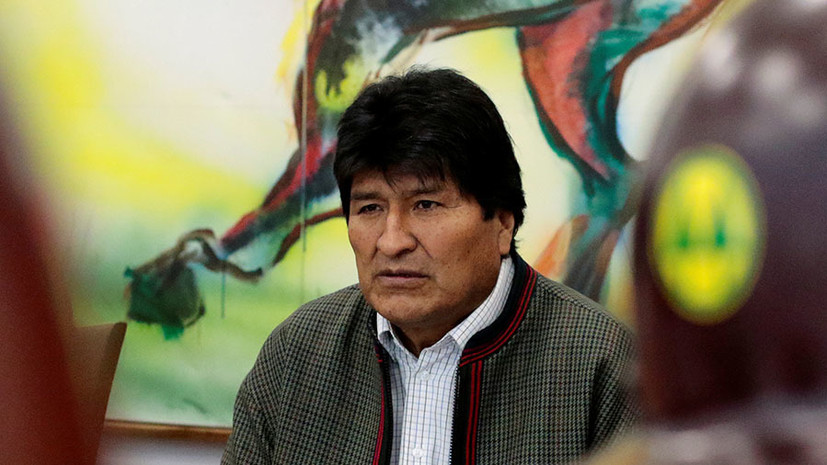The outgoing president of Bolivia, Evo Morales, flew to Mexico, where he was granted political asylum.
“Brothers and sisters, I'm flying to Mexico. I thank for the disinterestedness the government of this fraternal country, which provided asylum in order to save our lives, ”Morales wrote on Twitter.
Information on the displacement of the ex-Bolivian leader was confirmed by Mexican Foreign Minister Marcelo Ebrard. He posted on his Twitter photo of Morales aboard a government plane.
Ya despegó el avión de la Fuerza Aérea Mexicana con Evo Morales a bordo. De acuerdo a las convenciones internacionales vigentes está bajo la protección del de México. Su vida e integridad están a salvo. pic.twitter.com/qLUEfvciux
- Marcelo Ebrard C. (@m_ebrard) November 12, 2019“According to current international conventions, it is protected by Mexico. His life and health are out of danger, ”wrote Ebrard.
According to Morales, he is annoyed at the need to leave his homeland "for political reasons", but promised to return "with even greater strength and energy."
At the same time, the former president of the republic called on the people "not to plunge the country into violence" with those who seek to destroy the rule of law in Bolivia. He stressed that the crisis should be resolved through negotiations.
Morales also expressed gratitude to the union members of coca leaf producers in the tropical part of the Cochabamba department who sheltered him after announcing his resignation.
“So I spent the first night after I was forced to resign as president because of the coup that Carlos Mesa and Luis Fernando Camacho arranged with the help of the police,” the caption says.
Así fue mi primera noche después de dejar la presidencia forzado por el golpe de Mesa y Camacho con ayuda de la Policía. Así recordé tiempos de dirigente. Muy agradecido con mis hermanos de las federaciones del Trópico de Cochabamba por brindarnos seguridad y cuidado. pic.twitter.com/O1EpDhS5Qw
- Evo Morales Ayma (@evoespueblo) November 12, 2019Chewing coca leaves is permitted in Bolivia, but it is prohibited to produce drugs from these shrub plants. During the presidency of Morales, who himself was engaged in the cultivation of coca in his youth, the area of plantations of these plants was increased.
We add that a video appeared on social networks in which protesters break into the residence of the former president of Bolivia in Cochabamba and staged a pogrom there. At the same time, despite the resignation of Morales, riots continue on the streets of Bolivian cities, as a result of which members of parliament who discussed the situation in the country were evacuated.
The police in the capital's La Paz noted that they could not cope with the situation and requested help from the military. The head of the Armed Forces of Bolivia, Williams Kaliman, agreed to the use of soldiers in police operations against looters, emphasizing that these actions will be proportional. At the same time, he indicated that the military would not shoot at the civilian population and called on citizens to peace.
On November 10, Evo Morales announced his resignation from the presidency of Bolivia to normalize the situation in the country, which was complicated after the October 20 elections, as a result of which he was re-elected for a fourth presidential term.
Along with the 60-year-old politician, almost all of Bolivia's top leadership left their posts. On Tuesday, November 11, an extraordinary parliamentary meeting is expected, at which it will be approved who will lead the country before the presidential election. It is expected that the second vice-speaker of the Senate, Janine Agnes Chavez, representing the opposition party Social Democratic Movement will officially become the interim head of state. She is the oldest of the current civil servants.
“We have an election calendar, the population asks that we have an elected president on January 22. We will do our best to achieve this, ”said Agnes.
“The new stage of the Bolivian revolution begins”
Note that on November 12 at 23:00 Moscow time, an emergency meeting of the Permanent Council of the Organization of American States (OAS) on the situation in Bolivia will begin. At the same time, on the eve of the deputy head of the Russian Foreign Ministry, Alexander Pankin discussed the events with the ambassador of the republic in Moscow, Hugo Villarroel Sensano.
The Kremlin also called on Bolivian political forces to calm down and seek a dialogue-based settlement.
“We expect that all members of the world community, including the countries of the region, will show a responsible approach and some restraint. This also applies to the neighbors of Bolivia, ”said presidential aide Yuri Ushakov.
The resignation of Bolivian President Evo Morales was a turning point for democracy in the Western Hemisphere. This opinion was expressed by the head of the White House of the United States, Donald Trump. According to him, the United States admire the people of Bolivia, demanding freedom, and the armed forces of the republic, defending the Constitution, and not an exceptional one person.
"These events send a strong signal to the illegal regimes in Venezuela and Nicaragua that democracy and the will of the people will always prevail," Trump said.
Meanwhile, the Venezuelan leader, Nicolas Maduro, again called the events in Bolivia a coup d'etat, for which - like all the other events that took place in the region over the past 100 years - the United States is responsible. He also expressed his willingness to give his life to defend Bolivia and Evo Morales.
"This is not the end. A new stage in the Bolivian revolution begins. I’m sure Evo will be back, ”said Maduro.

